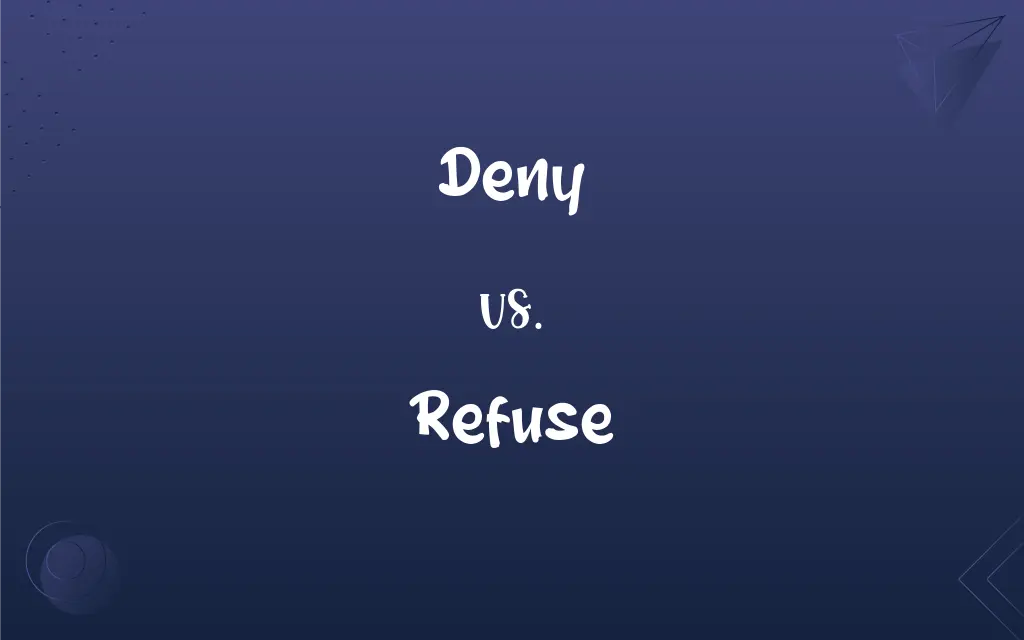Deny vs. Refuse: What's the Difference?
Edited by Aimie Carlson || By Harlon Moss || Published on December 27, 2023
"Deny" means to state that something is not true or reject a claim, while "refuse" means to decline or not accept something.

Key Differences
"Deny" primarily involves negating the truth of a statement or fact, implying a contradiction or rebuttal. "Refuse," on the other hand, is about declining an offer or request, showing unwillingness to accept or comply.
When someone "denies" something, they are often addressing a claim or an accusation, suggesting it is incorrect or false. In contrast, "refuse" is used when someone is presented with a choice or option and they decide not to take it.
"Deny" can also imply a refusal to grant something, like rights or privileges, but it retains the essence of contradiction. "Refuse" lacks this connotation of contradiction and is more about personal choice or decision.
In legal or formal contexts, "deny" is often used to reject allegations or formal charges. "Refuse," however, is more common in everyday language, indicating a personal decision to not accept or do something.
"Deny" often has a defensive tone, as it's used in response to something said or claimed by others. "Refuse," in contrast, is more proactive, indicating a clear decision or stance made independently.
ADVERTISEMENT
Comparison Chart
Context of Use
Often used in legal, formal, or argumentative contexts.
Commonly used in everyday, personal decision-making contexts.
Connotation
Implies contradiction or rebuttal of a fact or claim.
Indicates a decision or choice not to accept or do something.
Tone
Can be defensive, responding to accusations or claims.
More proactive, reflecting a personal stance or decision.
Implication
Suggests falsity or incorrectness of a statement.
Shows unwillingness or declination without the implication of falsity.
Relation to Truth
Related to the truthfulness or validity of something.
More about personal preference or choice, less about truth.
ADVERTISEMENT
Deny and Refuse Definitions
Deny
To state that something is not true.
He denied the allegations against him.
Refuse
To indicate unwillingness to do, accept, give, or allow something.
She refused to answer the question.
Deny
To withhold something from someone.
Access to the files was denied.
Refuse
To show reluctance or avoidance in accepting a situation.
They refused to believe the news.
Deny
To refuse to admit the truth or existence of something.
She denied any involvement in the scandal.
Refuse
To decline to grant or allow a request or offer.
He refused the job offer.
Deny
To refuse to acknowledge or recognize something; disown.
He denied his family's history.
Refuse
To reject or turn down an opportunity or option.
She refused the invitation to the party.
Deny
To not allow someone to have or do something.
The court denied his request for bail.
Refuse
To not consent to engage in a particular activity or process.
He refused to participate in the experiment.
Deny
To declare untrue; assert to be false
"A senior officer denied that any sensitive documents had been stored there" (Scott Ritter).
Refuse
To indicate unwillingness to do, accept, give, or allow
She was refused admittance. He refused treatment.
Deny
To refuse to believe; reject
Deny the existence of evil spirits.
Refuse
To indicate unwillingness (to do something)
Refused to leave.
FAQs
Is "refuse" appropriate in formal settings?
It can be used formally but is more common in everyday language.
Can "deny" be used in a legal context?
Yes, it's often used to contradict charges or allegations.
Is "refuse" always a verbal response?
It can be, but it also applies to actions or decisions.
Can "deny" imply a refusal to grant something?
Yes, like denying a request or privilege.
Do both words imply a negative response?
Yes, both indicate a form of negation or declination.
Can "deny" mean the same as "lie"?
Not exactly; "deny" is about rejecting a claim, not necessarily lying.
Is "refuse" more about personal preference?
Yes, it reflects a personal decision or choice.
Are "deny" and "refuse" interchangeable?
Not usually, as they have different connotations and uses.
Can "deny" be used in everyday conversation?
It can, but it's more common in formal or argumentative contexts.
Does "refuse" have a defensive tone?
It's less about defense and more about personal choice.
Can "refuse" be used in a legal context?
It's less common, but possible, especially in personal decision contexts.
Is "deny" a formal way to say "no"?
It can be, especially in rejecting claims or facts.
Can "deny" be used in a positive context?
Rarely, as it's mostly associated with negation or contradiction.
Can "deny" be used to disown something?
Yes, like denying responsibility or a connection.
Can "refuse" be polite?
Yes, depending on how it's expressed.
Does "deny" imply a more active response than "refuse"?
"Deny" is more about actively contradicting, while "refuse" is about declination.
Is "refuse" less confrontational than "deny"?
It can be, as it's more about personal choice than contradiction.
Is "refuse" a strong word?
It can be, depending on the context and tone.
Does "deny" always relate to truth?
Often, especially in contradicting claims or facts.
Does "refuse" imply a final decision?
It often does, indicating a clear and possibly final choice.
About Author
Written by
Harlon MossHarlon is a seasoned quality moderator and accomplished content writer for Difference Wiki. An alumnus of the prestigious University of California, he earned his degree in Computer Science. Leveraging his academic background, Harlon brings a meticulous and informed perspective to his work, ensuring content accuracy and excellence.
Edited by
Aimie CarlsonAimie Carlson, holding a master's degree in English literature, is a fervent English language enthusiast. She lends her writing talents to Difference Wiki, a prominent website that specializes in comparisons, offering readers insightful analyses that both captivate and inform.































































